This file is really only for my own information. Who else, pray tell, would want it? It's about stuff in or about Slavic languages that I can never seem to remember.
Palatization Stuff and Alphabets(It's hard to say at this point what to do with q, x, and w. Some languages have them and some don't. Most have them as an optional spelling for foreign words. Also, it's not clear [without looking into it much further] how to alphabetize some of these letters, especially the long vowels—are they really separate letters or not?)
In Czech only d, t, and n can be palatalized. Only ě, i, and í can mark palatalization. The letters ě, i, and í after other consonants mark where palatalization historically was but is no more. The letter ě in this latter case is now reckoned as je and not 'e.
Czech alphabet: a á b c č d ď e é ě f g h ch i í j k l m n ň o ó p r ř s š t ť u ú ů v y ý z ž (no ľ!)
The Slovak system varies a little bit from the Czech. Only d, t, n, and l can be palatalized. The letters i, í, and e mark palatalization. There is no way to use e after d, t, n, and l and keep a hard sound. But this is very rare in Slovak. The most common word with this situation in jeden (hard d with e).
The Slovak alphabet: a á ä b c č d ď dz dž e é f g h ch i í j k l ĺ ľ m n ň o ó ô p r ŕ s š t ť u ú v y ý z ž
In the Polish system, more consonants can be palatalized—p, b, m, w, k, g, c, n, s, and z. Palatalization is marked with an i following. If no vowel follows, then the consonant is hard. There are four exceptions though: c, n, s, and z can be soft if no vowel follows. These are marked ć, ń, ś, and ź. Note there is no such thing as ći. There is no such thing as ća. This would be cia. And so on with the other vowels after ć, ń, ś, and ź. Also, l is now pronounced hard but in spelling is reckoned as soft, so la is written, not lia. Conversely, there's probably no such thing as łi. Only li has a soft l.
The Polish alphabet: a ą b c ć d e ę f g h i j k l ł m n ń o ó p r s ś
t u w y z ź ż
Polish also has digraphs. Unlike the accented letters, they are not considered separate letters: ch cz dz dź dż rz sz
In the Sorbian languages, c, dz, s, z, n, r, p, b, m, w, k, g, ch, and h can be palatalized.
As in Polish, p, b, m, w, k, g, ch, (and h) can be palatalized only if a vowel follows. They lose palatalization if one doesn't follow. The vowels i and ě mark palatalization. The letter j also marks palatalization and, like Polish i, is silent. Thus we have pić, pěc, pjec, and pjata.
In Lower Sorbian, the consonants n and r are marked exactly the same way as above if a vowel follows. But these two consonants can be soft if no vowel follows. This is marked ń and ŕ. There are no spellings ńě or ńja, for example. Upper Sorbian only marks n this way. There is no ŕ.
The soft consonants ć, dź, ś, and ź always have an accent mark to mark softness. It doesn't matter which vowel follows or even if a vowel follows. Thus the forms of kosć are kosć, kosće, kosći, kosću, etc... By the way, Upper Sorbian does not have ś and ź either. The letters l and ł are treated the exact same way as in Polish.
There was a spelling reform of the Sorbian languages. They marked the palatalization of labials differently before, but I don't think these will display.
The South Slavic languages really present no problems.
In East Slavic languages, well, you know Russian. In Ukrainian the vowels е and и are hard. The vowels є and і are soft. The vowel ї is 'ji' (or 'yi'). Ukrainian does not have ы.
Belarusian has і for и. It is soft. Oddly, it has й. It has ы. Of course, this is hard. Also е is soft and э is hard as in Russian.
Slovak and Slovenian Compared
(The accent mark over the Slovene vowels only mark stress here. They are not usually written.
| Country | Language | Adjective (m. nom.) | Member of Ethnic Group (m) | Member of Ethnic Group (f) | |
|---|---|---|---|---|---|
| Slovak in Slovak | Slovensko | slovenčina | slovenský | Slovák | Slovenka |
| Slovene in Slovak | Slovinsko | slovinčina | slovinský | Slovinec | Slovinka |
| Slav in Slovak | — | slovanský | slovanský | Slovan | Slovanka |
| Slovene in Slovene | Slovénija | slovénščina, slovénsko | slovénski | slovénec | slovénka |
| Slovak in Slovene | Slováška | slováščina | slováški | slovák | slovákinja |
| Slav in Slovene | — | slovánski | slovánski | slován | slovánka |
Slovak
And: slovo is 'word', sloveso is 'verb', and slovník is 'dictionary'.Slovenian
Other words: slóvnica 'grammar', slovár 'dictionary, vocabulary', slovárček 'pocket dictionary', slôves 'reputation', slovésen 'solemn, festive', slovó 'leave, leave-taking', slóvstvo 'literature'.Other Stuff about Slovakia and Slovenia
The Internatonal Olympic Committee code for Slovakia is SVK. The code for Slovenia is SLO.
If a web address ends in .sk, it's from Slovakia. If it ends in .si, it's from Slovenia. Both countries, as members of the European Union, can use .eu, too.
The flags are kind of similar, too. Not only are they like one another, but they look like the flags of Russia, Serbia, the Netherlands, Luxembourg, and the Sorbs in Germany!
Here is the flag of Slovakia: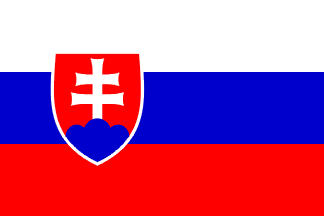
And here is the flag of Slovenia: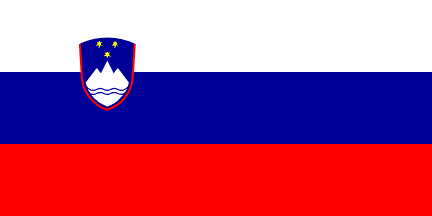
Russia's flag: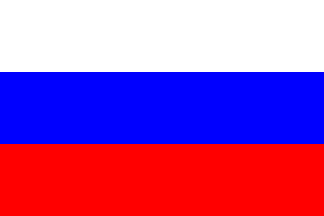
The Serbian state flag: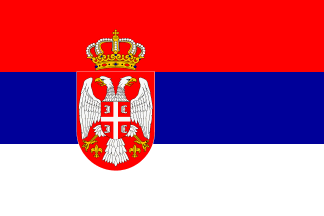
The Serbian civil flag: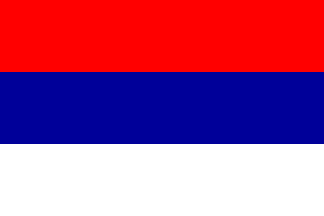
Here is the Sorbs' flag: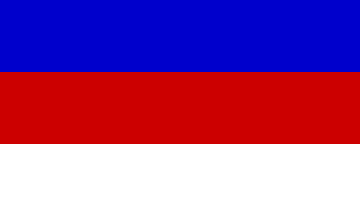
The Dutch have this flag: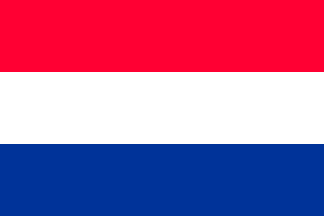
And finally Luxembourg has this one: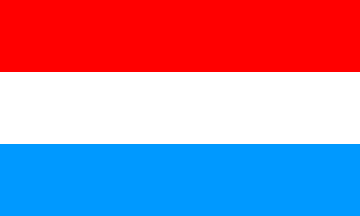
The flags are from Flags of the World.
Slavic Months
Here's something that really has nothing to do with anything. Some Slavic languages use a native set of names for months. Most use the Roman system (January, February, etc...). There doesn't seem to be any rhyme or reason for which language uses which system. At first, I thought it had to do with languages with Catholic speakers tending to use the Slavic system and the Roman one being used by Orthodox speakers, but this isn't the case.
After I typed all of this out, I found a little more at Wikipedia under Czech months. By the way, the Germans had an older system. And the Welsh and Manx still use a Celtic system. All Slavs used an older system at one point but most abandoned it. The Bulgarians, Macedonians, and Slovenians don't use one anymore. Anyway, here are the Slavic months that are still used:
- Czech (Oddly, Slovak uses the Roman names. Or at least I haven't been able to find the old ones.)
- leden
- únor
- březen
- duben
- květen
- červen
- červenec
- srpen
- záři
- říjen
- listopad
- prosinec
- Polish (Note marzec and maj. How did two Roman names get in there and why those two?)
- styczeń
- luty
- marzec
- kwiecień
- maj
- czerwiec
- lipiec
- sierpień
- wrzesień
- październik
- listopad
- grudzień
- Ukrainian (Russian uses Roman month names)
- січень
- лютий
- березень
- квитень
- травень
- червень
- липень
- серпень
- вересень
- жовтень
- листопад
- грудень
- Belarusian
- студзень
- люты
- сакавік
- красавік
- травень
- чырвень
- ліпень
- жнівень
- верасень
- кастычнік
- лістапад
- сьнежань (Emigrés use this; the more recent spelling is снежань)
- Upper Sorbian (From an Upper Sorbian grammar that is used in German schools: In vorhergehenden Lektionen
wurden bereits die alten sorbischen Monatsnamen genannt. Gewöhnlich werden im Sorbischen jedoch die Monatsnamen verwendet,
die lateinischen Ursprunges sind. In other words, they usually use the Roman ones now.)
- wulki róžk
- mały róžk
- nalětnik
- jutrownik or haperleja
- róžownik
- smažnik
- pražnik
- žnjenc
- požnjenc
- winowc
- nazymnik
- hodownik
- Croatian (But Serbian uses the Roman system.)
- siječanj
- veljača
- ožujak
- travanj
- svibanj
- lipanj
- srpanj
- kolovoz
- rujan
- listopad
- studeni
- prosinac